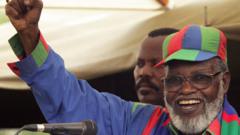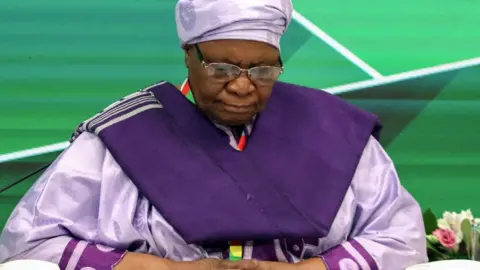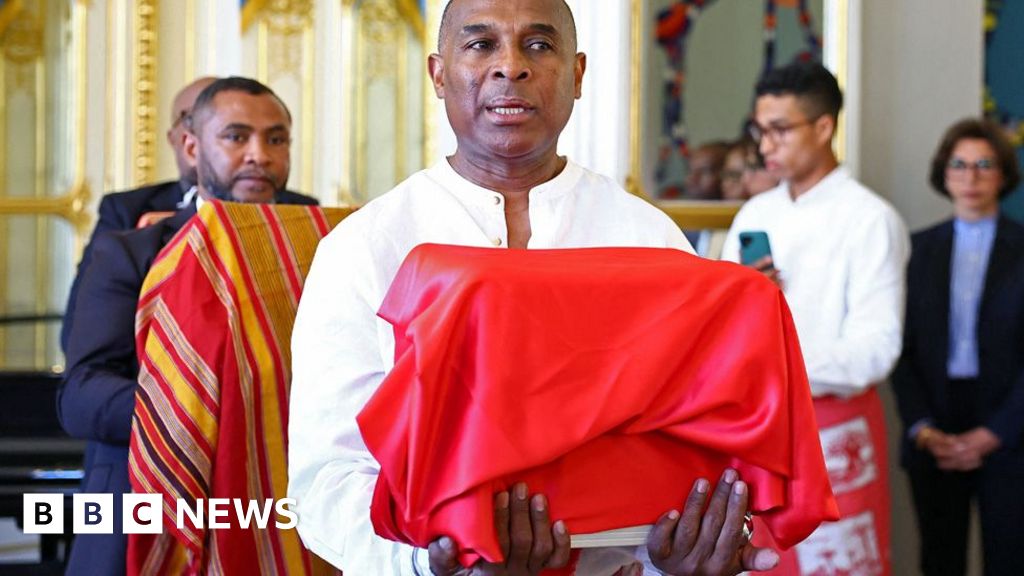In the heart of Africa, the passing of Sam Nujoma at the age of 95 has evoked profound national reflection and mourning. As the first president and a revered figure in Namibia's liberation struggle, Nujoma is remembered as the "father of the nation." His approachable demeanor, exemplified by his informal interactions with citizens, reflected his commitment to embodying the spirit of the people rather than an aloof authority.
Nujoma's legacy is rooted deep in the pain of Namibia’s colonial past, which included years of subjugation, first under German and later South African rule. After enduring centuries of exploitation and genocide, the Namibian people began a determined resistance against apartheid in 1966. Among them, Nujoma emerged as a pivotal leader. His humble beginnings, growing up in a peasant family, contrasted sharply with his later role as a freedom fighter and international diplomat.
The mid-20th century saw Nujoma forced into exile, but he never wavered in his mission. He traveled extensively, gathering international support, notably from the United Nations and allies in Africa and beyond, as he campaigned for global recognition of Namibia’s plight. His commitment to leadership in armed struggle against oppressive rule solidified his reputation, although it also earned him disparagement as a “Marxist terrorist” in the eyes of South African leaders.
With Namibia's independence achieved in 1990 following a lengthy guerrilla war, Nujoma became the first president. His governance focused on fostering national reconciliation and advancing social justice for all Namibians. His government put into place programs aimed at empowering women and upholding the rights of children, showcasing his vision for a fairer society despite criticisms for overstepping democratic norms on occasion.
During his continued influence after stepping down from the presidency, Nujoma nurtured Namibia’s political fabric, ensuring that democratic processes and peaceful governance remained hallmark traits of the newly liberated state. His leadership is credited with maintaining stability, allowing Namibia to become an exemplar of successful post-colonial governance in Africa.
While he has been lauded for achievements, such as promoting national unity among diverse ethnic groups, certain aspects of his administration drew scrutiny. His close ties with other controversial leaders and reluctance to engage with criticisms suggest a complex legacy that is both celebrated and contested.
As Namibia reflects on the monumental contributions of Nujoma, the future will undoubtedly continue to shape and redefine how he is remembered. The nation's progressions and challenges ahead will echo the foundational efforts he spearheaded in the quest for autonomy, showcasing the intricate balance of admiration and critical reflection that lives on in Namibian society today.
Nujoma's legacy is rooted deep in the pain of Namibia’s colonial past, which included years of subjugation, first under German and later South African rule. After enduring centuries of exploitation and genocide, the Namibian people began a determined resistance against apartheid in 1966. Among them, Nujoma emerged as a pivotal leader. His humble beginnings, growing up in a peasant family, contrasted sharply with his later role as a freedom fighter and international diplomat.
The mid-20th century saw Nujoma forced into exile, but he never wavered in his mission. He traveled extensively, gathering international support, notably from the United Nations and allies in Africa and beyond, as he campaigned for global recognition of Namibia’s plight. His commitment to leadership in armed struggle against oppressive rule solidified his reputation, although it also earned him disparagement as a “Marxist terrorist” in the eyes of South African leaders.
With Namibia's independence achieved in 1990 following a lengthy guerrilla war, Nujoma became the first president. His governance focused on fostering national reconciliation and advancing social justice for all Namibians. His government put into place programs aimed at empowering women and upholding the rights of children, showcasing his vision for a fairer society despite criticisms for overstepping democratic norms on occasion.
During his continued influence after stepping down from the presidency, Nujoma nurtured Namibia’s political fabric, ensuring that democratic processes and peaceful governance remained hallmark traits of the newly liberated state. His leadership is credited with maintaining stability, allowing Namibia to become an exemplar of successful post-colonial governance in Africa.
While he has been lauded for achievements, such as promoting national unity among diverse ethnic groups, certain aspects of his administration drew scrutiny. His close ties with other controversial leaders and reluctance to engage with criticisms suggest a complex legacy that is both celebrated and contested.
As Namibia reflects on the monumental contributions of Nujoma, the future will undoubtedly continue to shape and redefine how he is remembered. The nation's progressions and challenges ahead will echo the foundational efforts he spearheaded in the quest for autonomy, showcasing the intricate balance of admiration and critical reflection that lives on in Namibian society today.


















